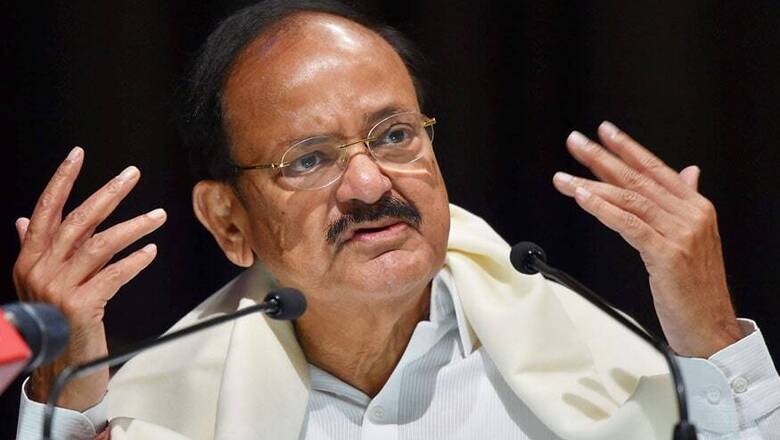
views
New Delhi: Restoring the prestige of the Upper House is his "immediate" priority, Vice President and Rajya Sabha Chairman M Venkaiah Naidu said Tuesday as he called for reframing rules to take care of "erring members" and suggested stricter provisions in the anti-defection law.
In an interview to PTI, Naidu also suggested a host of reforms such as a decision by presiding officers within three months of receiving a complaint against a member for changing party allegiance, and setting up special courts dedicated to election-related petitions for speedy disposal.
Those leaving their parties must also quit their House membership, Naidu said, elaborating on his suggestion to reform the anti-defection law for quick action against party hoppers.
"This is the minimum moral responsibility. I want to make it a Constitutional responsibility. Morals, some follow, some don't," Naidu, who completed a year in office last month, said.
The current law on defections does not prescribe a deadline for presiding officers to dispose of complaints submitted by political parties against defectors.
According to the law, at least two-third members of a legislature party have to defect for escaping punitive measures like losing membership of the House.
"The time has come that rules of Parliament should be reframed to take care of erring members and this is possible if there is a consensus," Naidu said.
He said a committee appointed by him to revise Rajya Sabha rules has submitted a preliminary report and will submit the final report by the end of October.
"My immediate concern is restoring prestige and decorum of Rajya Sabha...," he said when asked about his priorities in his second year in office.
Expressing his concern over the delay in presiding officers deciding on cases, he said there have been instances when a decision has taken five years.
"That is wrong... Every party tries to take advantage. All these petitions should be disposed of in three months," Naidu said.
Loopholes in the anti-defection act have to be addressed by amending the law to take care of "grey areas". Citing his decision on a Janata Dal (United) plea for disqualification of its Rajya Sabha MP Sharad Yadav, he said he had shown the way. Naidu had disqualified Yadav in December last year within three months of receiving the complaint against him.
"If you (presiding officer) sit on it and delay it, then it means you are going against the spirit of the law," he said.
Naidu also asked political parties to forge consensus on a national policy for Legislative Councils in states, saying there is a feeling among people that it is for the "rehabilitation" of politicians who are unable to get elected. But he has not taken a stand on the issue, the vice president clarified.
"I am not taking a specific position in this regard. I am more on having uniformity...there has to be a basis even if you want to have a Legislative Council," he said, noting that only seven of 29 states have Legislative Councils.
Days after Prime Minister Narendra Modi praised him for being a "disciplinarian", the vice president said no country can progress, prosper or be strong without discipline.
"You look at any developed country, they are all very disciplined and law-abiding. Even in communist China, though I do not agree with their system, discipline has helped them. Discipline is a positive way of life. I think that is the context in which the PM referred to discipline, not merely about discipline in Parliament," he said.
Naidu also pitched for equitable and proportional representation of different castes who get quota benefits, saying there is "certain unrest and unease" among targeted sections which feel only a few are getting the advantage.
"Reservation, what has been guaranteed, it should be there, it should not be touched. But within that, different communities, sections and subsections, there should be proportional representation. This is the wish among people and this needs to be examined thoroughly by political parties and parliamentarians," he said.
Last year, the Modi government appointed a commission to examine the sub-categorisation of almost 5,000 castes in the central list of Other Backward Classes (OBCs) to ensure "more equitable distribution" of reservations in central government jobs and educational institutions.
He said he handled two key events in his one year tenure -- the complaint against Yadav and a move by the Congress-led opposition to impeach Chief Justice of India Dipak Misra.
After consulting a host of experts, the Rajya Sabha chairman rejected the notice within days of receiving it.
Discussing the impeachment issue, he said, "It should be decided quickly. Urgency is required in such matters as a delay would cripple the institution."
Naidu said his decision was received well by the country — the legal fraternity, academics and the media. He said the two decisions gave him the "full satisfaction" that he had done his duty and a new trend was set.
He said he had undertaken 60 visits to different parts of country last year, including seven northeast states, attended 313 major outdoor events, covered 28 of the 29 states, including Union Territories.
He said he also visited 56 varsities and 21 leading science and research centres as part of his mission to "connect India".



















Comments
0 comment